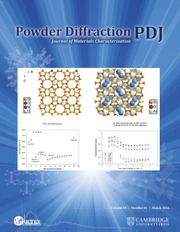Crossref Citations
This article has been cited by the following publications. This list is generated based on data provided by Crossref.
Volkov, Sergey
Petrova, Maya
Sinel’shchikova, Olga
Firsova, Vera
Popova, Valentina
Ugolkov, Valery
Krzhizhanovskaya, Maria
and
Bubnova, Rimma
2019.
Crystal structure and thermal properties of the Li Na1–KZnP2O7 solid solutions and its relation to the MM′ZnP2O7 diphosphate family.
Journal of Solid State Chemistry,
Vol. 269,
Issue. ,
p.
486.
Malathi, Maligi
Velchuri, Radha
Ravi, Gundeboina
Reddy, Chandhiri Sudhakar
and
Vithal, Muga
2024.
Preparation, characterization and photocatalytic studies of cation (Ag+) and anion (N3−) doped K2Zn(PO3)4.
Journal of Materials Science: Materials in Electronics,
Vol. 35,
Issue. 12,

